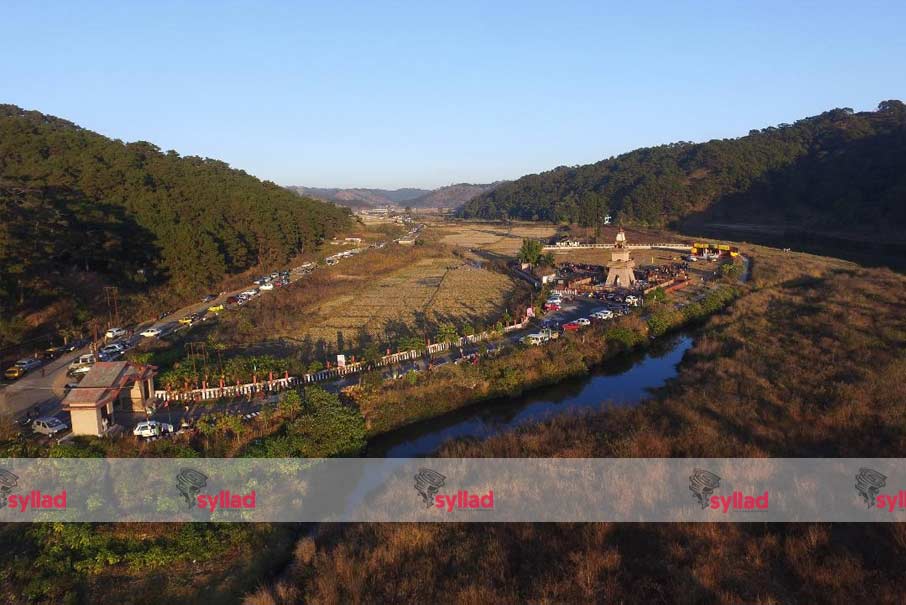U Kiang Nangbah the story of Tribal Democracy at Work

The Jañtia rebellion which started 1862 saw the rise of u Kiang Nangbah a commoner from a humble beginning to a freedom fighter who led his people against the mighty British Empire. From both historical evidence and local oral stories we learned that the cause of the uprising was due to the blunders made by the British officers stationed in Jowai; the sub-divisional headquarter then. U Kiang a young man rose to the occasion and fought valiantly against the mighty British Empire. The failure of the British to estimate the strength and more importantly the resolute and unity of the people in the face of adversary led to the prolonged fight against a rebellion of an unorganized group of this small Kingdom.
Jañtia Kingdom of the Pnar was traditionally divided into twelve elekas and almost all elekas have their own territories and interest and in most cases the elekas under the leadership of the Dalois were in conflict with each other. The defeat of the Jaintia King by the British was also a challenging occasion and at that point of time the people under the Kingdom including Dalois in the elekas were literarily left leaderless and rudderless.
It was because of this internal conflict amongst the Dalois which give the British wrong idea about the Jañtia Kingdom and they also failed to anticipate that an upheaval of a small tribal group could create so much trouble for the government of the empire where the Sun never set. This is obvious from the correspondence between the officers. Captain BWD Murton Deputy Commissioner of the Cossayah and Jynteah Hills, in his letter to Major J.C. Houghton, officiating Agent of Governor General, North East frontier in letter No. 278, dated Cheerapoonjee, the 28th August 1862 in which he stated “that the rebels has no general grievance, such as would in any way justify or account for rebellion of some dozen of inhabitants of which in ordinary circumstances had nothing in common, but were also at feud with each other.”
In the oral tradition we also have stories like the “Thmi thad-khiar” or the battle which ripped the fence of the eleka Nongtalang and the result of which certain villages in the eleka decided to integrate their territories with the eleka Jowai. Therefore the British officers were not wrong in taking this line of thinking because the elekas were indeed not at peace with one another for various reasons.

Then the officers also failed to understand how a mere interference in a religious festival of the native could escalate to a full fledge revolt against the Empire. Capt Murton further stated “that the only grievances which can be considered as one; is the solitary instance of Police interference with religious ceremony at Jallong Illakah (eleka Їalong).” Murton was also convinced “that mere interference with religious ceremony in Jallong will not account for a rebellion in Raliong District (eleka Raliang), the rulers of which, even in the face of common enemy declined to cooperate with the Illakah Jowai, to which the poonjee of Jallong (raid Їalong) is subordinate.” The British failed comprehend that the police meddling at Ialong where the soldier forcibly stopped the local from performing the religious warrior dance ‘chad pastieh’ and also confiscated and the swords and shields used in the ceremony could hurt the sentiment of the entire Pnar community. The incident at Їalong could very well be the last straw which sparked the Jañtia rebellion which unites the Pnar to fight against the government because they consider it a sacrilege.
With regard imposition of tax; Capt. BWD Murton was also of the opinion that “he cannot call complain against; a grievances as the governments were perfectly at liberty to impose what taxes they pleased on their own subject.” This is a major blunder of the government as levying tax by foreign power on the residence of the area is something that they cannot accept. Though people did pay some form of tax to the Daloi but it was in kind. I still remember of the ‘Wasan’ collecting ‘dan’ from the people who are not from eleka Jwai every Musiang and Khyllaw during the market day in Jowai. So it is not as if the people were not use to paying tax to the authority because people did pay ‘dan’ to the ‘wasan’ on behalf of the Daloi. But the question is why people were not ready to pay tax to the British government then?
The Jañtia rebellion was people’s immediate reaction to the intrusion of the British government on the day to day affairs of the people. Of course by 1862 Jañtia Kingdom was already under the dominion of the British kingdom and the King was paid a pension by the government. People had no leader and they were looking for a leader to lead them against these intolerable interferences of the foreign government. In his letter to the Officiating Commissioner of Assam, dated Jowai, the 30th of September 1862 BWD Murton DC of Cossyah and Jynteeah hills informed ‘that no chiefs of sufficient influence had as yet delivered themselves up.’ So till the end of September 1862, the government has not even been able to trace who the leader of the rebellion was, u Kiang Nangbah being a commoner who decided to rise to the occasion- remained elusive.
In his journal BWD Murton informed that at Jowai he met the Dolloye of Shillong Muntang and Jowai and when asked about the rebellion, the former feign ignorance about the rebellion while the later casually stated that it could be because of the Police interference with the religious ceremony at Jallong. Manik Pakyntein the Daloi of Jwai knew about the rebellion because as per oral tradition he helped imposed the tax by targeting a widow ka Lakhi Pyrdiang who lived in Chilliangraid and the people of Jwai have expressed their discontent to the Daloi.
From the above correspondence it can be established that there are three major causes of the Jaintia rebellion of 1862, the demand for restoration of the legitimate King of the Jaintia Kingdom whom the British had put on pension after the Pnars were defeated in the earlier rebellion. The second cause was the imposition of house tax and thirdly the irreverence act of the British police on the religious festival at Ialong and the shooting of animal from Khloo Langdoh, Jowai. The final cause of the rebellion was due to the insensitivity of the British to the religious sentiments of the native.
U Kiang Nangbah stuck to his demand for reinstatement of the King in spite of the fact that the royal family who came all the way from plain to meet him expressed their apprehension about the rebellion. They were afraid less they be blamed by the government for inciting the rebellion and deprived of the pension that was paid to them. When the ‘Kurs’ the clan of the King visited u Kiang Nangah in his hideout, they advised him not to demand for reinstatement of the King, lest they lose their pension, to this the rebels replied “in that case we have nothing to do with you, we will make whomever we like as a Rajah.”
What was initially considered a disturbance by the British officers in the region propelled into an independent uprising because the British had misjudged the strength and determination of the Jañtias. U Kiang Nangah and his followers were all commoner who had no military training. Perhaps; except for the few Dalois who decided to join him; the rest were mere peasants.
The Jañtia rebellion prove that the Pnar of Jaintia when face with adversary; set aside their difference and remain united to fight the common enemy. The Jañtia rebellion also showcased the true Khasi-Pnar democracy at work when a commoner was chosen to be leader and if need be even the King can be relegate by the public.

Leave a Reply